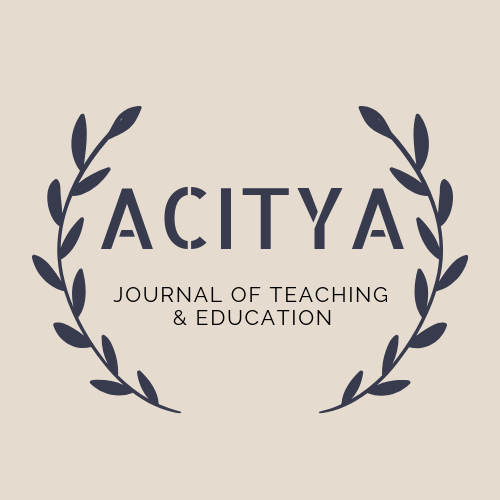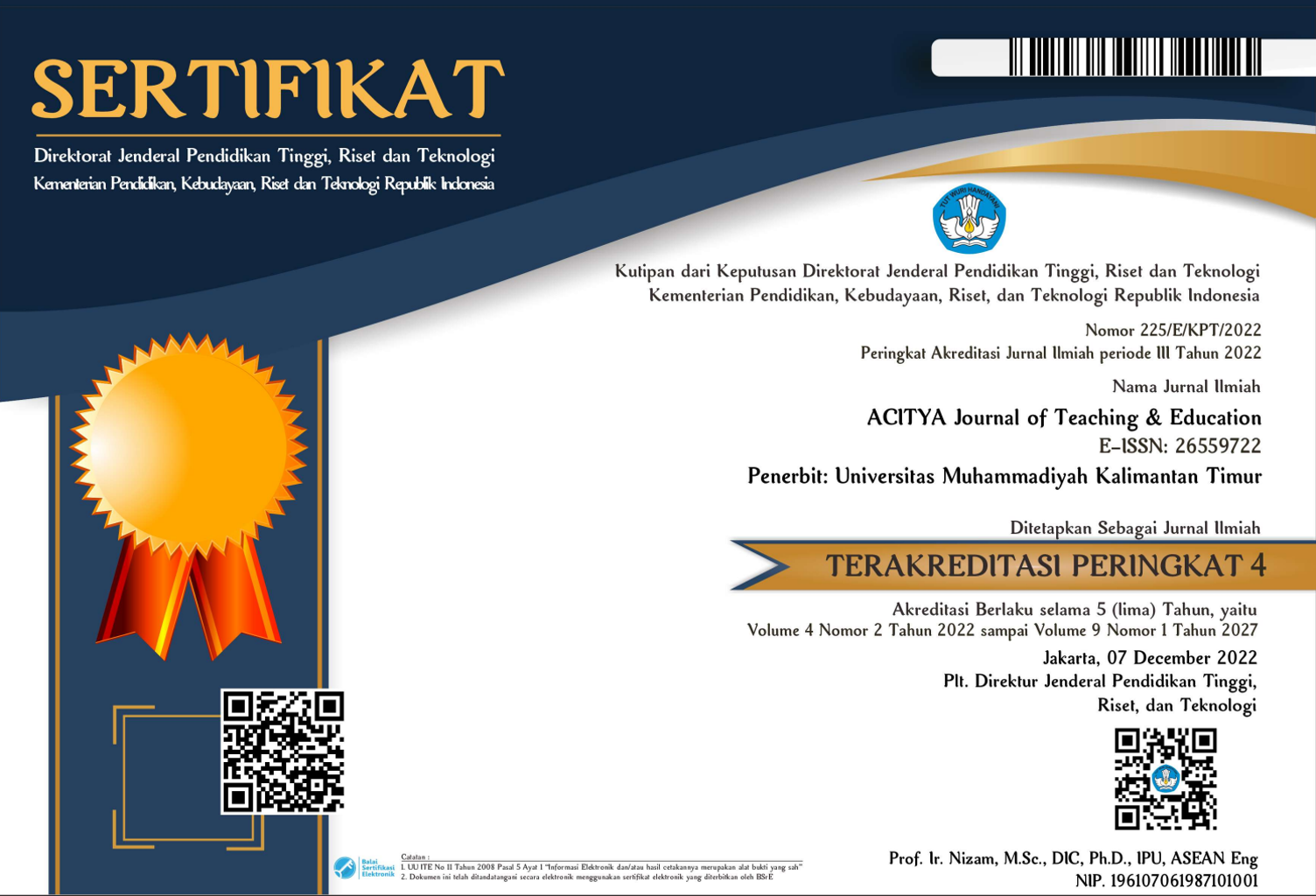Fostering Creative Writing through Poetry in EFL Classroom
DOI:
https://doi.org/10.30650/ajte.v6i2.3951Keywords:
Creative writing, poetry, ELT, EFL, teaching strategiesAbstract
This study was conducted to examine how the ELT teacher implements creative writing through poetry in the ELT classroom during pandemic and to describe how the students express their emotions through tone of poetry in their creative writing. It is due to the existence of creative writing in language teaching and learning practice is significant to gaining students’ creativity and thinking. One of them is writing poetry. However, few literatures discussed on the method used by teachers through writing poems as well as the concern for emotion and tone embedded in students’ writing products. This study used qualitative descriptive with Indonesian EFL university students of the non-English department at an Islamic University in Indonesia as the participants. The result shows that teachers use student-centered methods to implement creative writing through poetry in the classroom during the global COVID-19 pandemic. The meeting was organized using Zoom Meeting with performing Warm-Up, Lead-In (Creation of Poem and Reading the Poem), and Follow-up. In addition, it was also found that the student’s creative works posted on Instagram were based on the negative variations of poetry tone including threatening, painful, and discouraged. The study underscores the pedagogical efficacy of student-centered creative writing in ELT, highlighting its role in enhancing emotional intelligence and validating the integration of digital platforms for remote learning. It advocates for culturally responsive curricula that leverage creative expression as a conduit for emotional articulation and critical thinking
Downloads
References
Aladini, F. & Farahbod, F. (2020). Using a Unique and Long Forgotten Authentic Material in the EFL/ESL Classroom: Poetry. In Theory and Practice in Language Studies (Vol. 10, Issue 1). Academy Publication.
Ary, D., Jacobs, L.C., & Sorenson, C. (2010). Introduction to Research in Education: Eight Edition. Wadsworth Cengage Learning.
Bakri, M., Rahmat, A., & Lustyantie, N. (2019). Creative Thinking Using Metaphoric Language to Improve Poetry Writing Skills. Getsempena English Education Journal (GEEJ) 6(2), 200–213.
Brookhart, S. M. (2010). How to assess higher-order thinking skills in your classroom. Alexandria, VA: ASCD.
Cronin, C., & Hawthorne, C. (2019). ‘Poetry in motion ’ a place in the classroom: Using poetry to develop writing confidence and reflective skills. Nurse Education Today 76(January), 73–77. https://doi.org/10.1016/j.nedt.2019.01.026.
Dewi, R.F. & Tlonanen, Z. A. (2017). "The Involvement of Parents' Role and Habitus Toward Children Literacy" in The 1st International Conference on Language, Literature, and Teaching, 137-145. Muhammadiyah University Press.
Fithriani, R. (2021). "Poetry Writing in EFL Classrooms : Learning from Indonesian Students ’ Strategies" in AICLL (Annual International Conference on Language and Literature, KnE Social Sciences, 59–75. https://doi.org/10.18502/kss.v5i4.8667.
Gannon, S., & Dove, J. (2021). Artefacts, practices and pedagogies: teaching writing in English in the NAPLAN era. Aust. Educ.Res. 48, 657-679 (2021). DOI: https://doi.org/10.1007/s13384-020-00416-6.
Haraway, D. (2019). It Matters What Stories Tell Stories ; It Matters Whose Stories Tell Stories. IA/b: Auto/Biography Studies, 0(0), 1–11. https://doi.org/10.1080/08989575.2019.1664163
Harmer, J. (2001). The Practice of English Language Teaching. 3rd ed. England: Pearson Education Limited.
Hirsch, S., & Macleroy, V. (2019). English in Education Research Journal of the National Association for the Teaching of English The art of belonging : exploring the effects on the English classroom when poetry meets multilingual digital storytelling. English in Education, 00(00), 1–17. https://doi.org/10.1080/04250494.2019.1690394.
Ibán, R., Marcos, S., López, V., Teresa, M., González, D., & Phillips-silver, J. (2020). Promoting children's creative thinking through reading and writing in a cooperative learning classroom. Thinking Skills and Creativity, 36(May), 100663. https://doi.org/10.1016/j.tsc.2020.100663.
Ismuwardani, Z., Nuryatin, A., & Doyin, M. (2019). Implementation of Project-Based Learning Model to Increased Creativity and Self-Reliance of Students on Poetry Writing Skills. Journal of Primary Education 8(40), 51–58. DOI: https://doi.org/10.15294/jpe.v8i1.25229.
Kumar, T. (2020). Approaches in teaching writing skills with Creative Writing : A TESOL study for Indian learners. TESOL International Journal15(5), 78–98.
Lassig, C. (2020). A typology of student creativity: creative personal expression, boundary-pushing, and task achievement. Thinking Skills and Creativity, March, 100654. https://doi.org/10.1016/j.tsc.2020.100654.
Lee, S. (2019). Her Story or their own stories ? Digital game-based learning, student creativity, and creative writing. ReCALL First View, 1–17. https://doi.org/10.1017/S0958344019000028.
Lethbridge, S., & Mildorf, J. (2003). Verse Forms and Stanza Forms. Basics of English Studies : An Introductory Course for Students of Literary Studies in English, 141–175.
Mahani, S. (2023). Accessing Embodied Knowledge: Poetry as Culturally Relevant Pedagogy. Qualitative Inquiry, 0(0). DOI: https://doi.org/10/1177/10778004321176104.
Maher J. (1986) (ed). ‘Poetry for instructional purposes: Authenticity and aspects of performance’ in A Forum Anthology: 1979-83 Washington, D.C.: United States Information Agency: 327-333.
Maley, A. (2012). Creative writing for students and teachers. Humanizing Language Teaching, 14, 3, 1-18.
Naji, J., Subramaniam, G., & White, G. (2019). New Approaches To Literature For Language Learning. Switzerland: Palgrave Macmillan.
Ollila, B., & Jantas, J. (2006). “The Definition of Poetry” December 15, 2006 By: Bernie Ollila and Joe Jantas.
Rajendra, T. D., & Kaur, S. (2022). Print-Based Multimodal Texts : Using Illustrated Poems for Generating Ideas and Writing Narratives. Studies in English Language and Education, 9(1), 278–298. DOI: https://doi.org/10.24815/siele.v9il.21830.
Ramsaran, S. (1983). Poetry in the language classroom. ELT Journal, 37(1), 36–43. https://doi.org/10.1093/elt/37.1.36.
Rosenhan, C., & Galloway, N. (2019). Creativity, self-reflection, and subversion: poetry writing for Global Englishes awareness raising. System. https://doi.org/10.1016/j.system.2019.04.005.
Stange, T. V., & Wyant, S. L. (2008). Poetry Proves to be Positive in the Primary Grades. Reading Horizons: A Journal of Literacy and Language Arts, 48 (3). Retrieved October 2020 from https://scholarworks.wmich.edu/ reading_horizons/vol48/iss3/5.
Sigvardsson, A. (2019). Don’t Fear Poetry! Secondary Teachers’ Key Strategies for Engaging Pupils With Poetic Texts. Scandinavian Journal of Educational Research, 0(0), 1–14. https://doi.org/10.1080/00313831.2019.1650823.
Wale, B. D., & Bogale, Y. N. (2021). Using inquiry-based writing instruction to develop students ’ academic writing skills. Asian-Pacific Journal of Second and Foreign Language Education. 2021, 6:4. DOI: https://doi.org/10/1186/s40862-020-00108-9.
Xue, S., Son, Y.J., Yang, L., & Chen, S. (2023). Effects of Prior Knowledge and Peer Assessment on the Quality of English as a Foreign Language Poetry Writing. Empirical Studies of the Arts, 0(0). DOI: https://doi.org/10.1177/02762374231196735.
Zanden, P. J. A. C. Van Der, Denessen, E., Cillessen, A. H. N., Meijer, P. C., Zanden, P. J. A. C. Van Der, Denessen, E., & Cillessen, A. H. N. (2020). Fostering critical thinking skills in secondary education to prepare students for university : teacher perceptions and practices. Research in Post-Compulsory Education, 25(4), 394–419. https://doi.org/10.1080/13596748.2020.1846313.
Downloads
Published
How to Cite
Issue
Section
License
Copyright (c) 2024 Ruqoyyah Amilia Andania, Rohmatul Fitriyah Dewi, Mohammad Romadhoni, Ai-Chun Yen

This work is licensed under a Creative Commons Attribution 4.0 International License.
Authors retain copyright and grant the journal right of first publication with the work simultaneously licensed under an Attribution 4.0 International (CC BY 4.0) that allows others to share — copy and redistribute the material in any medium or format and adapt — remix, transform, and build upon the material for any purpose, even commercially with an acknowledgment of the work's authorship and initial publication in this journal.




.jpg)



